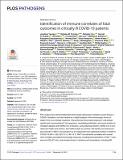Identification of immune correlates of fatal outcomes in critically ill COVID-19 patients
Author(s)
Youngs, Jonathan; Provine, Nicholas M.; Lim, Nicholas; Sharpe, Hannah R.; Amini, Ali; Chen, Yi-Ling; Luo, Jian; Edmans, Matthew D.; Zacharopoulou, Panagiota; Chen, Wentao; Sampson, Oliver; Paton, Robert; Hurt, William J.; Duncan, David A.; McNaughton, Anna L.; Miao, Vincent N.; Leaver, Susannah; Wyncoll, Duncan L. A.; Ball, Jonathan; Hopkins, Philip; Skelly, Donal T.; Barnes, Eleanor; Dunachie, Susanna; Ogg, Graham; Lambe, Teresa; Pavord, Ian; Shalek, Alexander K; Thompson, Craig P.; Xue, Luzheng; Macallan, Derek C.; Goulder, Philip; Klenerman, Paul; Bicanic, Tihana; ... Show more Show less
DownloadPublished version (4.144Mb)
Publisher with Creative Commons License
Publisher with Creative Commons License
Creative Commons Attribution
Terms of use
Metadata
Show full item recordAbstract
Prior studies have demonstrated that immunologic dysfunction underpins severe illness in COVID-19 patients, but have lacked an in-depth analysis of the immunologic drivers of death in the most critically ill patients. We performed immunophenotyping of viral antigen-specific and unconventional T cell responses, neutralizing antibodies, and serum proteins in critically ill patients with SARS-CoV-2 infection, using influenza infection, SARS-CoV-2-convalescent health care workers, and healthy adults as controls. We identify mucosal-associated invariant T (MAIT) cell activation as an independent and significant predictor of death in COVID-19 (HR = 5.92, 95% CI = 2.49–14.1). MAIT cell activation correlates with several other mortality-associated immunologic measures including broad activation of CD8<jats:sup>+</jats:sup> T cells and non-Vδ2 γδT cells, and elevated levels of cytokines and chemokines, including GM-CSF, CXCL10, CCL2, and IL-6. MAIT cell activation is also a predictor of disease severity in influenza (ECMO/death HR = 4.43, 95% CI = 1.08–18.2). Single-cell RNA-sequencing reveals a shift from focused IFNα-driven signals in COVID-19 ICU patients who survive to broad pro-inflammatory responses in fatal COVID-19 –a feature not observed in severe influenza. We conclude that fatal COVID-19 infection is driven by uncoordinated inflammatory responses that drive a hierarchy of T cell activation, elements of which can serve as prognostic indicators and potential targets for immune intervention.
Date issued
2021-09Department
Massachusetts Institute of Technology. Institute for Medical Engineering & Science; Massachusetts Institute of Technology. Department of Chemistry; Koch Institute for Integrative Cancer Research at MITJournal
PLoS Pathogens
Publisher
Public Library of Science (PLoS)
Citation
Youngs, Jonathan et al "Identification of immune correlates of fatal outcomes in critically ill COVID-19 patients." PLoS Pathogens 17, 9 (September 2021): e1009804.
Version: Final published version
ISSN
1553-7374